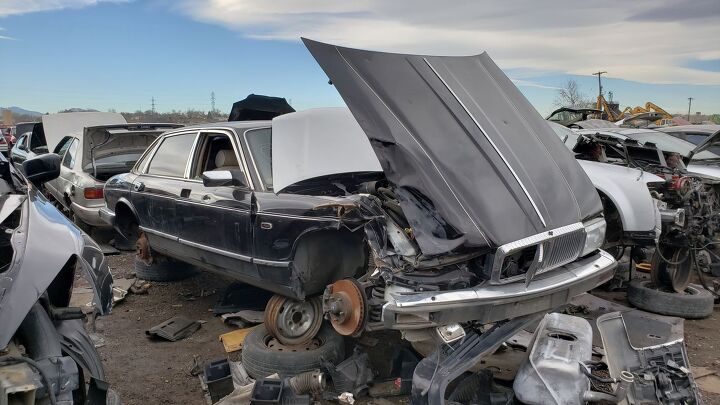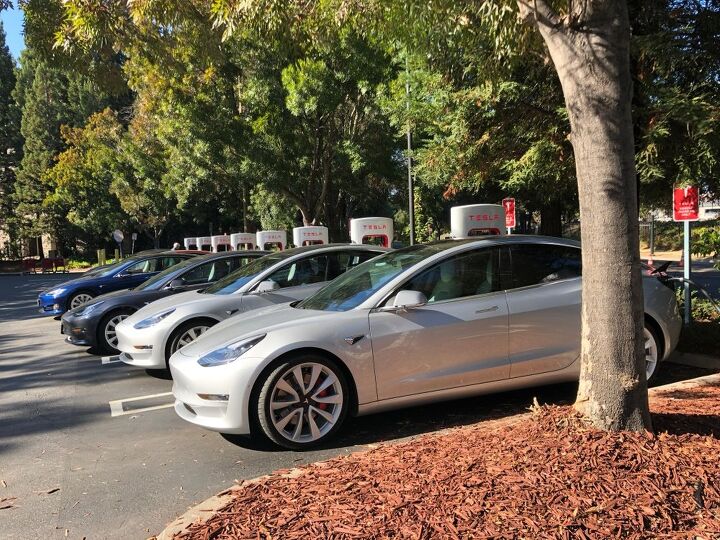#Environment
Activists Empty Tires on Dozens of SUVs in NYC
My grandmother used to tell me, “you can say almost anything you want as long as you say it respectfully.” That’s not entirely true for a bunch of reasons, but it can apply to specific situations. For instance, this group of climate “activists” deflating tires on SUVs in Brooklyn may have the right message, but delivering it through hundreds of flat tires is more likely to end in violence than any meaningful change.
Michigan Residents Squawk About Stinky Stellantis Plant
What’s that smell? According to some residents on Detroit’s east side, it’s the Mack assembly plant. The site of production for Jeep’s new three-row Grand Cherokee L and the recently introduced next-gen, two-row Grand Cherokee is rankling the noses of people who live in the vicinity, with some calling for the state’s enviro cops to hold Stellantis to some measure of accountability.
It’s the latest in a series of escalating actions by residents and their representatives, with a hotline phone number cropping up a couple of weeks ago followed by yesterday’s proposal that included a Stellantis-funded voluntary relocation effort and home repair program.
Passing Gas: Some Automakers and Countries Commit to Ending Fossil Fuel Vehicles by 2024
You’ll notice an intentional and obvious use of the word ‘some’ in that headline. At the COP26 global climate summit currently being held in Glasgow, a handful of automakers and two dozen countries committed to an agreement calling for the end of fossil fuel vehicles by 2040 or earlier.
Headline signatories include the likes of Ford, GM Volvo, and Mercedes – along with reps from places such as Canada, the U.K., and Sweden. Not everyone chose to jump on board, however, including a couple of major world powers and two of the planet’s largest car companies.
Opinion: Big Fines and EPA Crackdowns Spell Big Trouble for Speed Shops
Emerald-Colored Glasses: Just How Green Are EVs?
As the resident sourpuss, I make it my business to complain about every industrial hypocrisy that crosses my path and the automotive sector has kept me so busy that there’s hardly any time left to address my own failings. Though I do have to confess that I sometimes feel guilty about how frequently I’m compelled to gripe about electric vehicles. Provided that you’re willing to work with their charging limitations and less-than-impressive ranges, EVs have a lot to offer even in their current state. But the way they’ve been marketed has been so consistently disingenuous that I often end my days on the cusp of a frustration-induced aneurysm.
The winds appear to be changing, however.
After years of watching the industry bang its head against the wall, the media seems prepared to shift its position. Accelerated adoption of pure electrics doesn’t seem to be happening and too many EV startups have ended up being little more than an opportunity for investors to throw away money. Increasingly fewer people ask me about battery-powered cars in a way that suggests true enthusiasm. Excitement has given way to dubiousness as more people have begun to ponder if electrics are really all they’re cracked up to be.
Senate Confirms Biden Admin Pick to Head EPA
On Wednesday, the U.S. Senate voted 66-34 to confirm Michael Regan as the next administrator of the Environmental Protection Agency (EPA). The Biden campaign had signaled that it wanted to clean house following appointments from the Trump administration well before the election, noting that the EPA was of particular importance since it needs to be in line with the bold energy strategy. Regan’s role as administrator is essential since he’ll have the ability to encourage the United States to reduce emissions wherever possible.
Whereas the Trump administration sought to undo Obama-era policies it deemed untenable and soften the power of highly influential independent executive agencies, Biden and company are bent on restoring those policies while strengthening some of its own. Regan (44) is presumed to pursue greenhouse gas emissions reductions for automobiles, powerplants, and oil refineries by any means available. He began his career as an environmental regulator for the EPA during the Clinton administration, stayed on through the Bush years, and later joined the Environmental Defense Fund — a nonprofit environmental advocacy group that frequently partners with multinational companies to create “market-driven” solutions to climate change.
California Wins the Gas War, Fickle Automotive Coalition Realigns Position
The Coalition for Sustainable Automotive Regulation (CSAR) is officially withdrawing from a lawsuit between California and federal authorities over the coastal state’s ability to establish its own emissions standards. California leadership had vowed to ignore the Trump administration’s proposed rollback and began making binding side deals with automakers (specifically BMW, Ford, Volkswagen, Volvo, and Honda) committed to adhering to the aggressive limits established under President Obama. Unfortunately, this ran the risk of undermining the revised national standards penned shortly after the United States became energy independent. It also set up the CSAR to embrace any entity that had views conflicting with California Air Resources Board.
Federal concerns were that the Golden State setting its own targets would butt heads with the relaxed national benchmarks and ultimately divide the U.S. market and may even influence the types of vehicles that were manufactured for all of North America. But the issue became moot once President Biden broke the record for executive orders by signing 22 in his first week. Predictably, the brunt of these were designed to instantly undo any actions taken throughout the duration of the Trump administration and included one directing the Department of Transportation and EPA to reconsider the 2019 decision to remove California’s authority to limit tailpipe emissions by April and revise the fuel-efficiency standards for automobiles by summer.
Activist Attacks Oil Companies by Shaming Ad Agencies
Environmental activist Jamie Henn, and his firm, Fossil Free Media, are attacking advertising and PR agencies that work on oil industry accounts. Their initiative, Clean Creatives, is designed to shame some of the world’s largest PR and ad agencies in hopes that they will resign.
“We want to get PR and ad agencies to stop working with the oil industry because they are spreading misinformation about climate change and lobbying action to address the crisis,” said Henn. “Our reliance on fossil fuels is driving global warming which will have serious impacts on our environment, health, and economy.”
Chalk Up Another Benefit to the Big Lockdown…
Barring low gas prices you couldn’t take advantage of and your author’s adventures in cooking with curry, the past two months didn’t bring much in the way of benefits. Millions are out of work, nerves are frayed, hospital ICUs remain crowded with COVID-19 patients, and bad takes still run rampant on Twitter. Daily!
Anyone who did venture outdoors this spring, however, may have noticed one specific change for the better, and science now backs it up.
Study Suggests Tires Create More Pollution Than Exhaust Emissions
Anyone who’s laid a substantial amount of rubber in a local parking lot will tell you that the scent emitted doesn’t smell particularly healthy for the environment (burnt clutch smell is even less appealing — don’t ask how I know). And while the typical driver doesn’t burn through tires via successive smoke shows, regular road use effectively does the same thing over a much longer timeline — and a new study claims it’s up to 1,000 times worse than what actually comes out of a vehicle’s exhaust system.
The report, penned by UK-based independent research firm Emissions Analytics, has circulated within the media for a few days and claims that pollution stemming from tire and brake wear is a growing problem. With European lawmakers clamping down on tailpipe emissions, the firm suggests “non-exhaust emissions” will be the next big regulatory challenge.
UK Expedites the Internal Combustion Car's Death Sentence
The clock’s ticking, Britain. You have 15 years.
In a bid to firm up its environmental cred, the UK has announced its intention to move up its planned ban on internal combustion vehicle sales from 2040 to 2035. In a country with a rising population and a declining amount of power generation, the move should have a few people pulling out their hair.
Especially those who make their living building cars.
QOTD: Concerned About Consumption?
An article from a reputable news website made the rounds yesterday, one which, as expected, raised an eyebrow of yours truly, to say nothing of other members of the TTAC crew.
It’s not without a strong argument, packaged though it is in the language of a sanctimonious scold eager to tick all the boxes required to draw viewers. The Great Circa 2014 Digital Media Template dies hard, at least in Twitterland. The piece itself is a little more tame. But beneath the broad brush strokes lies a question.
Green Clash: German Environmentalists Protest Tesla Factory
The catapulting of environmental issues to the forefront of public discourse has spawned many unlikely clashes between greens of different stripes. Climate protesters against CO2-free nuclear power generation, eco types versus high-speed electric rail, and now, angry Germans demanding Tesla stop stealing its water.
The electric automaker’s attempt to build a massive factory in the European country has hit a social roadblock.
2020 Nissan Titan Fuel Economy Figures Emerge
What can a nine-speed automatic do for a full-size pickup that once carried a seven-speed unit and a reputation for guzzling fuel at a prodigious rate?
That’s a question answered not by the EPA, which hasn’t gotten around to posting updated MPG figures for the refreshed 2020 pickup, but by its counterparts north of the border. Natural Resources Canada has the new figures on file, but you’re out of luck if you’re only interested in rear-wheel drive Titan models. For 2020, Canadians aren’t allowed to have those.
UK City Signs Off on Diesel Ban, Leaving Thousands With Second-class Cars
It’s not just the increased taxation on diesel fuel that’s prompting Europeans to throw in the towel on compression ignition. Look to local lawmakers for Reason Number One why diesel, which just a few years ago comprised the majority of new car sales in the UK, is suddenly less popular than this writer was in high school.
Following similar moves by select German cities and other jurisdictions, the UK city of Bristol has become the first municipality in that country to approve a diesel ban, with fines set to be levelled against anyone caught entering the city with a non-spark engine. Amazingly, this motley crew of second-class vehicles includes transit buses.






























Recent Comments